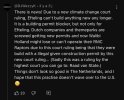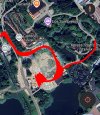FORUMS - COASTERFORCE
You are using an out of date browser. It may not display this or other websites correctly.
You should upgrade or use an alternative browser.
You should upgrade or use an alternative browser.
Walibi Holland | YoY | RMC Raptor | 2025
- Thread starter TPoseOnTantrum
- Start date
Peet
Giga Poster
I don't know anything about it whatsoever, but the answer to your question is no, obviously it's not true.
RollerCoastersFrolicking
Mega Poster
wheres this person source? and is it reliable
It doesn't matter, it's completely fictitious.wheres this person source? and is it reliable
CloudRuben
Roller Poster
Well, there could be some truth to it, but things are very unclear at the moment on this topic. I work in this field, but I never thought on this topic in relation to themeparks.
Efteling for sure is affected by this ruling in the (near) future, and with their projects of the last 5 years. They were already in trouble regarding nitrogen deposition rulings. I don't know about Walibi. The impact of this ruling is extremely unclear at this time. Keep that in mind.
With the recent ruling, a lot of (construction) projects of the last 5 years are now deemed illegal. They have to legalize their projects before 2030, which might be almost impossible. This could affect YoY. I can imagine that Yoy is now technically illegal, strange as it souds...
It has to do with the nitrogen crisis in the Netherlands, which started in 2019 and has not been resolved since. This crisis is about the poor state of our EU protected natural areas, called Natura 2000-areas. There is an excess of nitrogen deposition and currently no way of solving this problem. Politics on the topic are completely stuck on this topic. This has a huge impact on our (construction) permit system. There is an English wikipedia article about it: https://en.wikipedia.org/wiki/Nitrogen_crisis_in_the_Netherlands
This recent ruling is on a method to show that you do not damage the Natura 2000-areas, called 'intern salderen' with nitrogen emissions. Therefore, you do not need a specific permit dealing with the protection of Natura 2000-areas, a 'nature permit'. The court ruled that you cannot use this method to show that you do not cause damage. They ruled that this method can only be used to get a nature permit.
With the ruling, all projects that used this method to avoid getting a nature permit, are now illegal and need to get a nature permit before 2030. Getting a nature permit for nitrogen related issues is next to impossible at the moment. Our Natura 2000-areas are in very bad shape and there is no political will to change anything... In theory, if they cannot legalize the already build project, it could be demolished. That would be very harsh and also very unlikely, but crazy things have happened with regards to nitrogen...
EDIT: I found some source in English on the ruling. On first glance, it seems correct. It is all very technical, so feel free to DM me. https://www.houthoff.com/insights/n...deren-met-stikstof-niet-langer-vergunningvrij
EDIT2: Rewritten to make it easier to understand for non-Dutch readers
Efteling for sure is affected by this ruling in the (near) future, and with their projects of the last 5 years. They were already in trouble regarding nitrogen deposition rulings. I don't know about Walibi. The impact of this ruling is extremely unclear at this time. Keep that in mind.
With the recent ruling, a lot of (construction) projects of the last 5 years are now deemed illegal. They have to legalize their projects before 2030, which might be almost impossible. This could affect YoY. I can imagine that Yoy is now technically illegal, strange as it souds...
It has to do with the nitrogen crisis in the Netherlands, which started in 2019 and has not been resolved since. This crisis is about the poor state of our EU protected natural areas, called Natura 2000-areas. There is an excess of nitrogen deposition and currently no way of solving this problem. Politics on the topic are completely stuck on this topic. This has a huge impact on our (construction) permit system. There is an English wikipedia article about it: https://en.wikipedia.org/wiki/Nitrogen_crisis_in_the_Netherlands
This recent ruling is on a method to show that you do not damage the Natura 2000-areas, called 'intern salderen' with nitrogen emissions. Therefore, you do not need a specific permit dealing with the protection of Natura 2000-areas, a 'nature permit'. The court ruled that you cannot use this method to show that you do not cause damage. They ruled that this method can only be used to get a nature permit.
With the ruling, all projects that used this method to avoid getting a nature permit, are now illegal and need to get a nature permit before 2030. Getting a nature permit for nitrogen related issues is next to impossible at the moment. Our Natura 2000-areas are in very bad shape and there is no political will to change anything... In theory, if they cannot legalize the already build project, it could be demolished. That would be very harsh and also very unlikely, but crazy things have happened with regards to nitrogen...
EDIT: I found some source in English on the ruling. On first glance, it seems correct. It is all very technical, so feel free to DM me. https://www.houthoff.com/insights/n...deren-met-stikstof-niet-langer-vergunningvrij
EDIT2: Rewritten to make it easier to understand for non-Dutch readers
Last edited:
My reading of this is that it is to do with nitrogen deposition, rather than emission. In other words, giving enough opportunity for nitrogen to be reabsorbed by 'nature'. My interpretation is that the old permit system was only required if you were going to offset a loss of nitrogen deposition outside some local proximity to the new construction (e.g. similar to the idea of remote carbon offsetting - planting trees in Norway to offset your building in London), and if you did it locally (e.g. planting new trees/grass around your brownfield site) then you didn't need a permit. It sounds like the new permit system will require an assessment of all projects (presumably over some nominal value/scale/etc - possibly planning permission related), regardless of where the offsetting would take place.Well, there could be some truth to it, but things are very unclear at the moment on this topic. I never thought about it on the topic of themeparks, but I sort of work in this field.
Efteling for sure is affected by this ruling in the (near) future, and with their projects of the last 5 years. I don't know about Walibi. This are extremely unclear on this topic. Keep that in mind.
The ruling talks about so called 'nature permits'. It has to do with the nitrogen crisis in the country, which started in 2019 and has not been resolved since (so much for the 'crisis' part). The highest court (Raad van State) ruled that we do not properly protect our Natura 2000-areas against an overload of nitrogen deposition. If your project can significantly affect these Natura 2000-areas, you need a permit to make sure nature is not damaged; a natuurvergunning or 'nature permit'.
The recent ruling from December last year is on a procedure to circumvent the need for such a permit. It is called 'intern salderen' and has to do with the nitrogen emissions of a project. The court has now ruled that this procedure can no longer be used to circumvent the need of a nature permit, but made it part of getting this permit.
This will affect parks for future projects, as these types of permits are very difficult, if not impossible, to get. Every project who used this procedure in the last 5 years now has to get a nature permit within the next 5 years. It is unclear if this will be possible. That will very much depend on the project and the affected Natura 2000-areas.
In theory, if they cannot legalize the already build project, it could be demolished. That would be very harsh and also very unlikely, but crazy things have happened with regards to nitrogen...
EDIT: I could try to add some (Dutch) references to the ruling, but it is very technical. There is a wikipedia article in english, but the latest ruling is not on there: https://en.wikipedia.org/wiki/Nitrogen_crisis_in_the_Netherlands. Feel free to DM me.
EDIT2: I found some source in English on the ruling. On first glance, it seems correct. https://www.houthoff.com/insights/n...deren-met-stikstof-niet-langer-vergunningvrij
There are lots of planning related subjects like this (in the UK) - %-green space, SUDS, carbon, renewables, right-to-light, acoustics, air quality, and probably more - it's usually a case of showing the before/after and how you're not making the situation worse than it already is.
Applying this retrospectively, and cancelling (/demolishing!) already completed projects, would be very difficult to uphold I would imagine. In the UK at least, I'd be highly surprised if a piece of legislation like this could be enforced to that degree retrospectively. More likely that any future projects may have harsher measures enforced (e.g. must improve the nitrogen deposition by 5% overall, rather than 2% overall (made-up numbers)) in an attempt to retrospectively claw back some of the impact on nature.
No professional consultancy body nor court (I would wager), would provide the advise that demolishing your newly constructed thing (in other words, wasting all of that time/energy/carbon/etc) was the right answer to a piece of legislation like this.
So yeah - I think this is a bit of a scaremongering nothing-story, really.
CloudRuben
Roller Poster
The original post is scaremongering. Things will be fine until 2030, since they have time to legalize the coaster. However, that might not be possible, given the poor state of our Natura 2000-areas. This will for sure halt many expansion plans from now on.My reading of this is that it is to do with nitrogen deposition, rather than emission. In other words, giving enough opportunity for nitrogen to be reabsorbed by 'nature'. My interpretation is that the old permit system was only required if you were going to offset a loss of nitrogen deposition outside some local proximity to the new construction (e.g. similar to the idea of remote carbon offsetting - planting trees in Norway to offset your building in London), and if you did it locally (e.g. planting new trees/grass around your brownfield site) then you didn't need a permit. It sounds like the new permit system will require an assessment of all projects (presumably over some nominal value/scale/etc - possibly planning permission related), regardless of where the offsetting would take place.
There are lots of planning related subjects like this (in the UK) - %-green space, SUDS, carbon, renewables, right-to-light, acoustics, air quality, and probably more - it's usually a case of showing the before/after and how you're not making the situation worse than it already is.
Applying this retrospectively, and cancelling (/demolishing!) already completed projects, would be very difficult to uphold I would imagine. In the UK at least, I'd be highly surprised if a piece of legislation like this could be enforced to that degree retrospectively. More likely that any future projects may have harsher measures enforced (e.g. must improve the nitrogen deposition by 5% overall, rather than 2% overall (made-up numbers)) in an attempt to retrospectively claw back some of the impact on nature.
No professional consultancy body nor court (I would wager), would provide the advise that demolishing your newly constructed thing (in other words, wasting all of that time/energy/carbon/etc) was the right answer to a piece of legislation like this.
So yeah - I think this is a bit of a scaremongering nothing-story, really.
After 2030 I think it is possible they are not allowed to operate YoY any longer for example. We see court rulings getting more strict every year, as things just do not improve. There are tens of thousands of companies operating illegally right now. Like I said, things are very uncertain at the moment.
What's the old Russian proverb, "trust, but verify"?
So I dug to find actual reporting on the court ruling: https://www.msn.com/en-us/politics/...-slash-nitrogen-emissions-by-2030/ar-AA1xFssW
Considering that roller coaster construction is essentially a large steel-works effort, similar to building a large multi-use condo or building, nitrogen emissions are relatively low compared to other emissions. Nitrogen emissions primarily originate from business or activities that use organic material or processes (livestock is a great example of the Nitrogen Cycle). CO2 or other criteria emissions from steel fabrication, cement off-gassing for footer placement, or on-site diesel generators are certainly present. However, nitrogen emissions would be relatively low (even then, as nitrous oxide, such as from an internal combustion engine on-site).
Roller coaster and broader amusement park industry construction isn't the target of the legislation, and wouldn't begin to immediately worry that this means no roller coasters after 2030.
So I dug to find actual reporting on the court ruling: https://www.msn.com/en-us/politics/...-slash-nitrogen-emissions-by-2030/ar-AA1xFssW
In earnest, the regulations and lawsuit target farming practices, particularly pig and cattle farming, which are notorious for high nitrogen and methane emissions. To @Hixee and @CloudRuben’s point, it seems a new permitting system is required for compliance. While there would technically be risks to projects using the previous permitting system, the existing legal framework for zoning and coding in the West generally grandfathered in existing structures to new permitting or regulation reform, or at the very least provided special consideration for how to comply with a new regulation compared to new construction.A Dutch court ordered the government on Wednesday to drastically cut nitrogen emissions in the Netherlands by 2030, in a ruling that could hurt construction and will pressure farmers to reduce livestock.
The case was brought by Greenpeace, which said the government was not doing enough to lower illegally high levels of nitrogen oxide emissions caused by intensive farming and heavy use of fertilizers, as well as traffic and construction in the densely-populated Netherlands.
Considering that roller coaster construction is essentially a large steel-works effort, similar to building a large multi-use condo or building, nitrogen emissions are relatively low compared to other emissions. Nitrogen emissions primarily originate from business or activities that use organic material or processes (livestock is a great example of the Nitrogen Cycle). CO2 or other criteria emissions from steel fabrication, cement off-gassing for footer placement, or on-site diesel generators are certainly present. However, nitrogen emissions would be relatively low (even then, as nitrous oxide, such as from an internal combustion engine on-site).
Roller coaster and broader amusement park industry construction isn't the target of the legislation, and wouldn't begin to immediately worry that this means no roller coasters after 2030.
CloudRuben
Roller Poster
You are referring to a different ruling from a lower court on January 22 of 2025. That suit was started by Greenpeace. That one is more general and aims to force the government to take action. Yes, there are several lawsuits on this topicWhat's the old Russian proverb, "trust, but verify"?
So I dug to find actual reporting on the court ruling: https://www.msn.com/en-us/politics/...-slash-nitrogen-emissions-by-2030/ar-AA1xFssW
In earnest, the regulations and lawsuit target farming practices, particularly pig and cattle farming, which are notorious for high nitrogen and methane emissions. To @Hixee and @CloudRuben’s point, it seems a new permitting system is required for compliance. While there would technically be risks to projects using the previous permitting system, the existing legal framework for zoning and coding in the West generally grandfathered in existing structures to new permitting or regulation reform, or at the very least provided special consideration for how to comply with a new regulation compared to new construction.
Considering that roller coaster construction is essentially a large steel-works effort, similar to building a large multi-use condo or building, nitrogen emissions are relatively low compared to other emissions. Nitrogen emissions primarily originate from business or activities that use organic material or processes (livestock is a great example of the Nitrogen Cycle). CO2 or other criteria emissions from steel fabrication, cement off-gassing for footer placement, or on-site diesel generators are certainly present. However, nitrogen emissions would be relatively low (even then, as nitrous oxide, such as from an internal combustion engine on-site).
Roller coaster and broader amusement park industry construction isn't the target of the legislation, and wouldn't begin to immediately worry that this means no roller coasters after 2030.
The ruling I was discussing was done by the highest court in the Netherlands on 18 December 2024. That one is much more specific and also affects projects from the last 5 years. It can very much include construction projects, like the construction of YoY.
There is an intepretation of the 2024 ruling in English: https://www.houthoff.com/insights/n...deren-met-stikstof-niet-langer-vergunningvrij. This is the official link to the Dutch summary of the ruling: https://www.raadvanstate.nl/actueel/nieuws/december/rechtspraak-over-intern-salderen-wijzigt/. It is actually 2 simultaneous rulings.
Short term, both rulings will not immediately affect recent projects, like YoY or Danse Macabre at Efteling. It will affect expansion plans in the next couple of years. What happens after 2030 and if YoY is still allowed to operate by then, nobody knows at the moment...
But we are getting off-topic.
On topic, I very much like the look of these coasters, but I don't think I will rush out to ride them. Something feels lacking
Last edited:
Ahhh got it. Glad to know other countries aside from the U.S. also have confusing court systems and ruling procedures.You are referring to a different ruling from a lower court on January 22 of 2025. That suit was started by Greenpeace. That one is more general and aims to force the government to take action. Yes, there are several lawsuits on this topicIt is a mess.
The ruling I was discussing was done by the highest court in the Netherlands on 18 December 2024. That one is much more specific and also affects projects from the last 5 years. It can very much include construction projects, like the construction of YoY.I do not know if YoY is affected by the 2024 ruling. Walibi is for sure affected by this ruling, given the way the permit system works.
There is an intepretation of the 2024 ruling in English: https://www.houthoff.com/insights/n...deren-met-stikstof-niet-langer-vergunningvrij. This is the official link to the Dutch summary of the ruling: https://www.raadvanstate.nl/actueel/nieuws/december/rechtspraak-over-intern-salderen-wijzigt/. It is actually 2 simultaneous rulings.
Short term, both rulings will not immediately affect recent projects, like YoY or Danse Macabre at Efteling. It will affect expansion plans in the next couple of years. What happens after 2030 and if YoY is still allowed to operate by then, nobody knows at the moment...
But we are getting off-topic.
On topic, I very much like the look of these coasters, but I don't think I will rush out to ride them. Something feels lacking
Flash Shift
Mega Poster
Ok as dumb as the name is, that entrance is pretty cool!
Thekingin64
Strata Poster
If single rider queue is separate from the start, guess there won't be much chance of choosing which side you get?
Glad to see there is a single rider queue but given the large differences in both sides, it might cause issues for those who want a particular side
Glad to see there is a single rider queue but given the large differences in both sides, it might cause issues for those who want a particular side
Efteldingus
Mega Poster
I assume the single rider queue splits for the two coasters later on, probably right before going into the station to save space on unnecessary queueline. The station doesn't have a central loading platform, like Joris en de Draak at Efteling for example. In order for the SRQ to reach both loading platforms it has to split somewhere further along.If single rider queue is separate from the start, guess there won't be much chance of choosing which side you get?
Glad to see there is a single rider queue but given the large differences in both sides, it might cause issues for those who want a particular side
Hutch
Strata Poster
Single rider queue is gonna be tough when the trains have single person cars...
I suppose you'll run into instances where a train has three seats left for your party of four and you don't want to split up the group among multiple trains, but it's really not like you'll be riding together anyway.
I suppose you'll run into instances where a train has three seats left for your party of four and you don't want to split up the group among multiple trains, but it's really not like you'll be riding together anyway.
witchfinder
Giga Poster
Single rider queue is gonna be tough when the trains have single person cars...
I suppose you'll run into instances where a train has three seats left for your party of four and you don't want to split up the group among multiple trains, but it's really not like you'll be riding together anyway.
Yeah, single rider on single-file trains just seems like a stupid idea really
Hutch
Strata Poster
I mean, considering this is a dueling cred, and that these raptors seem to move through people pretty well (assuming they're using the simultaneous unload/load procedure), the main queue will probably be pretty easy anyway. I guess it's nice there's the extra option, but they really didn't need to.
There won't be a loop if i'm correct. This would be the pathing, Goliaths plaza won't be the connecter, it's more towards the kids area they build there, it will finally remove the dead end though with a connection at the dead end near the rapids. Giving some nice views of Xpress too!!Glad you mentioned it, I was looking at it yesterday and yeah... that path access is absolutely baffling. It LOOKS like they've converted the service road surrounding YoY into actual guest pathways so you can walk entirely around the ride (and connects to the (food?) building on the lake), but that's inexcusable if the whole 'YoY loop' path is ONLY accessible through the Goliath plaza. It 100% needs a connection from beside Condor, or from the rapids.
View attachment 35844






